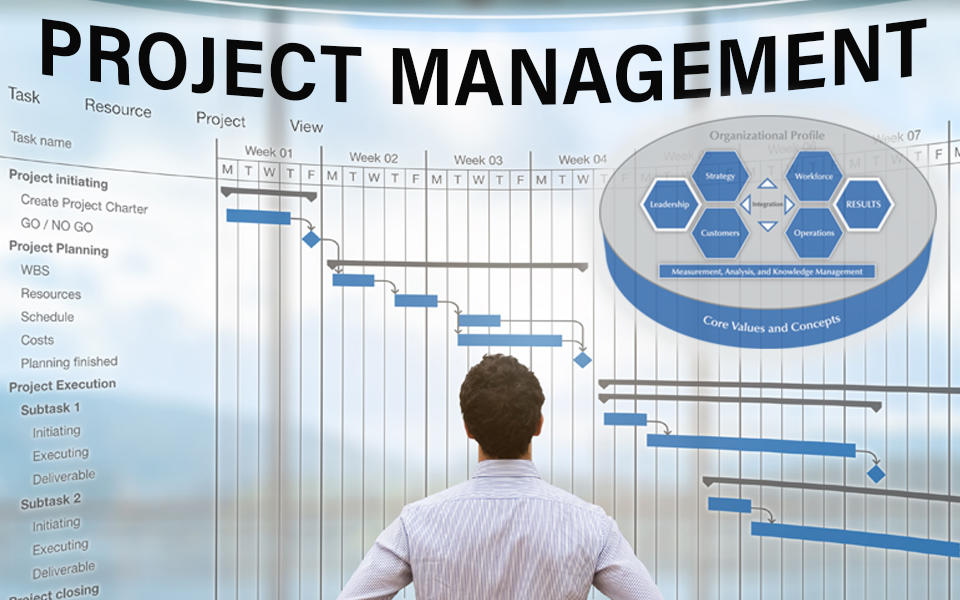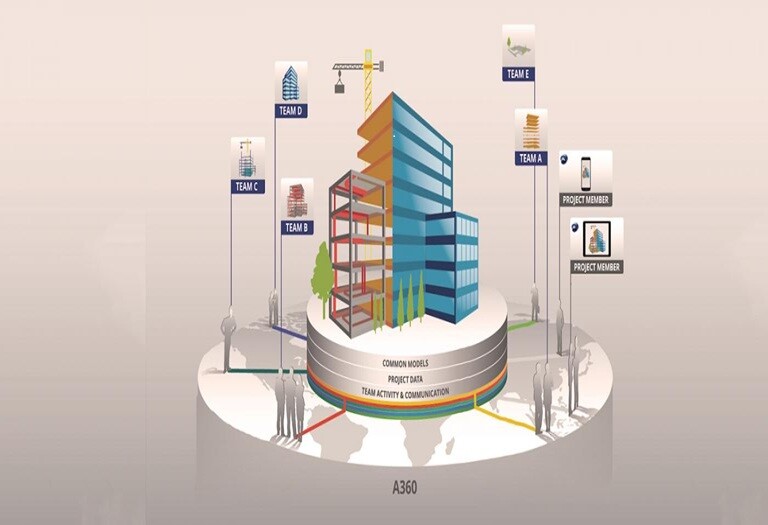Top 5 Online BIM Project Management Courses to Enroll in for 2025

Table of Contents
What is BIM Project Management?
Building Information Modelling (BIM) is a digital approach that helps create a virtual building model of a project before the construction begins. It helps improve collaboration among designers, construction professionals, and stakeholders so everyone knows the project’s current state. Managing construction projects using BIM technology and methodologies is known as BIM Project Management. BIM Project Management includes BIM software and tools to improve collaboration, communication, and decision-making throughout the project lifecycle, from concept to final design and execution to maintenance. Through these digital models and collaborative processes, BIM Project Management seeks to improve efficiency, reduce errors, and enhance communication among all stakeholders for better results.
Application of BIM in Project Management
Management. collaboration, coordination, communication, exchange, and collation are some key aspects that define BIM project management. To understand more about what BIM project management is, let us know about its applications.
- Design Development and Visualisation: A 3D digital model using BIM helps project managers visually explore the design. Visual designs improve the understanding and communication of the project's scope, facilitating design development and decision-making.
- Collaboration and Communication: BIM encourages collaboration and enhances communication by enabling real-time transfer of project-related information and modifications.
- Clash Detection and Coordination: BIM software identifies conflicts or clashes in the design or construction elements before they become issues on-site. Project managers can resolve these clashes early, reducing rework and project delays.
- Cost Estimation: BIM models provide accurate cost estimation and tracking throughout the project lifecycle. Project managers can monitor expenses, compare budgets to actual costs, and make informed financial decisions.
- Scheduling: BIM can be used with project scheduling software to build 4D models, help project managers visualise the sequence, identify potential scheduling conflicts, and optimise project timelines for construction.
- Quantity Estimation: BIM models can automatically generate quantity takeoffs for materials and components, streamlining the process of procurement and resource allocation.
- Risk Analysis: BIM facilitates risk analysis by simulating different construction scenarios and assessing their impact on the project schedule and budget.
- Quality Assurance and Control: Project managers can use BIM to compare the as-built model with the as-designed model, identifying deviations and ensuring that construction adheres to quality standards.
- Facility Management: Beyond construction, BIM models are valuable for facility managers during the operation and maintenance phase. They provide a complete digital record of the building components, to manage and maintain easily. These digital records also make it easier to plan maintenance tasks and track the building's performance over time.
When it comes to managing BIM projects, you will require the help of some software solutions. Modelling, coordinating, communicating, scheduling, calculating expenses, and ensuring quality are all capabilities of BIM technologies. Of course, the software you choose should be determined by what you require and how your organisation functions. Here are some of the most common software options for managing BIM projects.
- Autodesk Revit: This is one of the most popular BIM tools for architectural design and documentation. It enables architects to create detailed 3D models of buildings and includes features for collaboration and coordination.
- ARCHICAD: ARCHICAD is a BIM software specifically designed for architects. It offers comprehensive modelling, documentation, and collaboration tools for architectural design.
- Vectorworks Architect: Vectorworks Architect is a BIM software tailored to architects and designers. It provides 2D and 3D design capabilities with BIM functionalities for creating architectural models.
- Revizto: Revizto is a real-time issue-tracking and collaboration tool used by architects to communicate and resolve design and coordination issues in BIM projects.
- SketchUp: While not a pure BIM tool, SketchUp is widely used by architects for 3D modelling and conceptual design. It can be integrated into BIM workflows, particularly in the early design phases.
- BIMx: This is a viewer application for ARCHICAD models, which allows architects to share 3D BIM models with clients and stakeholders on mobile devices for design review.
- Bluebeam Revu: Bluebeam Revu is used for PDF markup and collaboration in design and construction projects. Architects use it for reviewing and annotating drawings and documents.
- Enscape: Enscape is a real-time rendering and visualisation tool that integrates with BIM software like Revit and ARCHICAD. Architects use it to create realistic 3D visualisations of their designs.
Roles and Responsibilities of the BIM Project Manager
A BIM project manager uses BIM technology to oversee and manage building projects. Their duties are varied, necessit
ating a blend of good communication, technical BIM tool knowledge, and project management abilities. The following are some crucial details that will help you understand more about the duties and obligations of a BIM project manager:
| Roles | Responsibilities |
| BIM Strategy Development | Developing BIM protocols and guidelines, engaging with clients to understand their requirements, and identifying opportunities for innovation and improvement. |
| Team Collaboration and Communication | Working with stakeholders to promote BIM, scheduling meetings to track progress, resolve problems, and increase communication, settle disputes involving BIM procedures or information. |
| Technology and Tool Management | Integrating BIM technologies and procedures and ensuring that project stakeholders use them effectively, choosing and setting up BIM software. |
| Data Management and Quality Control | Managing BIM data and models by ensuring accuracy, consistency, and compliance with project specifications while conducting quality checks to correct discrepancies or errors. |
| Risk Management | Recognising the risks related to BIM and developing measures to mitigate them, as well as generating backup plans to manage these risks. |
| Project Oversight and Reporting | Tracking BIM costs, managing project timelines, maintaining documentation, and generating regular reports on progress, issues, and outcomes for stakeholders and management. |
| Sustainability and Compliance | Utilising BIM for sustainable design to ensure compliance with industry standards, and deliver as-built models and data for facility management and maintenance. |
Check out this to advance your career in BIM: 6 BIM Certifications You Can Get for Career Advancement
BIM Manager Skills, Certifications and Salaries
This table shows the salary ranges, required skills, and relevant certifications for BIM Managers at various career levels. With BIM and its many software not being part of the standard curriculum in most systems, most professionals upskill themselves using BIM project management courses.
| Category | Salaries (INR) | Skills | Certifications |
| Entry-Level BIM Manager | ₹50,00,000 - ₹65,00,000 | Proficiency in BIM software, Strong Project Management skills, Excellent team collaboration and communication skills. | Autodesk Certified Professional (ACP) - Revit. Building Performance Analysis (BPA) Specialist. |
| Mid-Level BIM Manager | ₹65,00,000 - ₹90,00,000+ | Clash Detection, ability to manage multiple projects, BIM execution planning. |
Certified Construction Manager (CCM). Certified Professional in BIM (CPBIM). |
| Senior-Level BIM Manager | ₹90,00,000 - ₹1,15,00,000+ | Knowledge of programming and scripting languages, project risk management skills |
Top 5 BIM Project Management Online Courses
Below mentioned is the table comparison and list of top 5 BIM project management courses available online.
|
Course |
Duration |
USP |
Fees |
|
BIM Professional Course for Civil Engineers by Novatr |
7 months |
Everything about BIM for Infrastructure, from 4D & 5D modeling to BIM Workflows & leading Softwares. Placement Support is also included. |
INR 1,95,000 |
|
Project Management With BIM Technology by Econstruct Design |
7-12 months |
Revit Architecture, Revit Structures and Revit MEP |
INR 1,88,800 |
|
Certificate in Building Information Modelling (BIM) - Project Management By RICS Online Academy |
8 months |
Application of BIM principles, processes, and methodologies |
GRB 1,530.00 |
|
Advanced Construction Management- CACM by Construction Management Training Institute, Bengaluru |
12 weeks |
Understanding BOQs and specifications, Quantity Surveying, Rate Analysis |
INR 30,000 |
|
BIM Management Programme by Zigurat Institute of Technology |
12 months |
Teaches BIM for Construction, BIM for Asset Management and BIM Implementation |
On request |
1. BIM Professional Course for Civil Engineers by Novatr
Duration: 7 months
Fees: INR 1,95,000
Curriculum:
- Basics of information modelling
- Modelling parametric structure families
- Documentation and presentation
- BIM (Building Information Modelling) for infrastructure
- BIM coordination and workflow
- 4D and 5D BIM modelling
- Model bases clash detection and coordination
Key Features: Through its BIM course, Novatr provides a thorough curriculum for professional growth. This 7-month online course, taught by BIM professionals from top firms, offers a full overview of BIM processes and software skills, including modelling, information management, cloud collaboration, presentation, clash detection, and visual programming. It also includes everything that would be part of a BIM project management course, making it a great choice for professionals looking to shift towards construction project management. To improve their BIM and design abilities under the direction of professionals from the industry, students and professionals can also take part in a simulated capstone project, which follows RIBA standards. Novatr also offers a BIM Professional for Architects, that helps architects learn BIM methodologies and techniques.
2. Advanced Construction Management- CACM by Construction Management Training Institute, Bengaluru
Duration: 12 weeks
Fees: INR 30,000
Curriculum:
- Material management
- Soil investigation and foundations
- Understanding BOQs and specifications
- Quantity Surveying
- Rate analysis
- 3D printing in construction
- Augmented and Virtual Reality
- Entrepreneurship opportunities for civil engineers
- Formwork in Construction
- Construction supervision
Key Features: The BIM project management course aims to produce engineers with marketable skills through short-term Construction Management courses. CMTI in Bangalore creates course materials by industry experts, offering relevant training and job opportunities. The Certificate Course on Advanced Construction Management is an excellent option for working professionals or aspiring engineers.
Also Read - 7 Best Quantity Surveyor Courses For Civil Engineers
3. Certificate in Building Information Modelling (BIM) - Project Management By RICS Online Academy
Duration: 8 months
Fees: GBP 1530.00
Curriculum:
- Introduction to BIM
- Transition to ISO 19650
- Assessment and Need
- Invitation to Tender and Tender Response
- Appointment and Mobilisation
- Information production and planning
- Information Model Delivery & Project Close-out
- BIM for Operations
Key Features: This BIM project management course offers a comprehensive guide to applying BIM principles, processes, and methodologies per ISO 19650 standards. It covers the entire BIM project lifecycle and enables construction professionals and owners to consolidate their approach towards BIM Delivery. Through simulated projects, participants can learn more about collaboration, data control, and information management, and reducing project risks in this BIM project management course.
4. Master’s in Global BIM Management by Zigurat Institute of Technology
Duration: 12 months
Fees: On Request
Curriculum:
- BIM Management
- BIM for design
- BIM for construction
- BIM for asset management
- BIM Implementation
Key Features: The master’s BIM project management course teaches managing BIM projects and personnel using the latest technology and equipment. It involves a final master's thesis (FMT), a real-project simulation-based exercise using Open BIM methodology. The program covers design, costs, safety, clash detection, scheduling, sustainability, and effective facility management aspects used by architects, engineers, owners, and contractors.
5. Master Study in Project Management With BIM Technology by Econstruct Design and Built PVT Ltd.
Duration: 7-12 months
Fees: INR 1,88,800
Curriculum:
- AutoCAD
- Civil 3D
- Revit Architecture
- Revit Structures
- Revit MEP
- Synchro or Navisworks
- Infraworks
- MSP or Primavera
Key Features: Econstruct Design and Build provides a 7-month working experience letter upon the successful completion of their BIM project management course. They will also provide a 7-month Master Study Certification. Each candidate is assisted in creating a portfolio. Help in creating a visual or video résumé. Only after passing the Exam is certification granted.
Conclusion
BIM is a methodology that has significantly transformed the construction industry by creating virtual building models and enhancing stakeholder engagement. It improves communication, minimises errors, and increases efficiency. BIM is a valuable tool for construction professionals, encompassing design development, clash detection, cost estimation, scheduling, and sustainability analysis.
An underscored benefit of BIM is its capability to make construction project management much easier than before. With improved strategy development, collaboration, technology management, risk management, project oversight, and compliance, BIM project management makes projects complete faster and within budget.
Novatr provides a BIM professional training for civil engineers taught by industry specialists with considerable real-world experience. The training covers modern technology that can help with innovative and streamlined work processes. Furthermore, Novatr's Resources page has useful information on Architecture, Engineering, and Construction (AEC) employment and software.

 Thanks for connecting!
Thanks for connecting!
-1.png)




.png)
.jpg)





